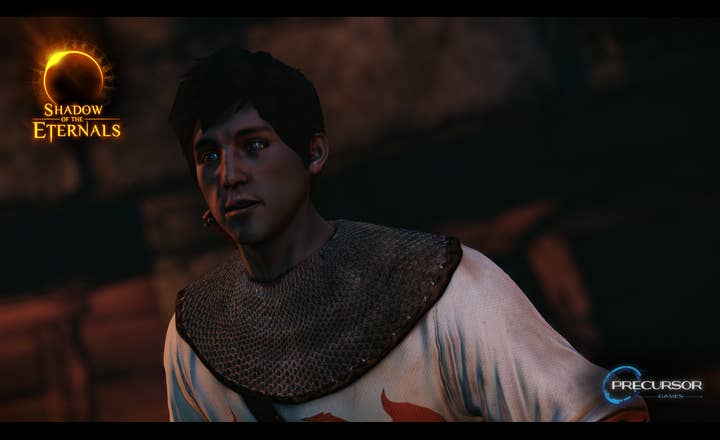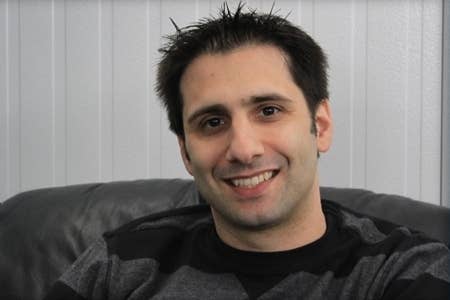Precursor: We "understand the skepticism" about Silicon Knights ties
CEO Paul Caporicci talks to us about his studio's crowdfunding project, Shadow of the Eternals, which uses art assets from Silicon Knights
Earlier this week, Precursor Games, a new startup based out of Hamilton, Ontario revealed itself and its crowdfunding campaign for Shadow of the Eternals. The new developer is comprised largely of former Silicon Knights employees, including its CEO Paul Caporicci and its chief creative officer, Denis Dyack. The project is clearly something that many of the former Silicon Knights crew have wanted to do for some time now; the game's a "spiritual successor" to Eternal Darkness: Sanity's Requiem, a game released exclusively on GameCube back in 2002, and the studio's last unqualified success.
Caporicci, who was laid off from Silicon Knights along with others last July, is fully aware of the negative sentiment that many have developed towards its leader Denis Dyack and the suspicions many have about whether the talent is capable of making something compelling. 2008's Too Human fizzled on release, scrapping plans to turn it into a trilogy, and 2011's X-Men: Destiny was another critical and commercial dud.
"We realize that those negative impressions exist and we're doing our best to show everyone Precursor is a totally new entity," Caporicci stressed to GamesIndustry International. When we commented that some feel it's like Silicon Knights in new clothing, Caporicci was quick to refute that notion. "I understand that skepticism but we just want an opportunity to show people that it's not that."

"We did work at Silicon Knights but we're trying to do something new and it's different positions and a different structure and it is a wholly different company," he continued.
Following the X-Men: Destiny disaster, including allegations that Silicon Knights deliberately sabotaged it to shift resources to an Eternal Darkness 2 demo to pitch to publishers (as outlined by Kotaku), and the lawsuit lost to Epic Games, Silicon Knights was hit hard, reportedly becoming nothing more than a skeleton crew. The official closure of the St. Catherines-based studio was never announced, and requests to Denis Dyack to talk about what really happened at Silicon Knights thus far have gone unanswered. [Update: It's been revealed that Silicon Knights' offices have been closed.]
For his part, Caporicci, who served at times as a lead programmer and a director at Silicon Knights, refused to talk about his previous employer. "I can't comment on Silicon Knights. I can only comment on me. I was laid off...I was really disappointed and I just wanted to turn that into a positive, so I reached out to other people to see if they're interested in doing a brand-new company, and it kind of snowballed from there," he said.
Caporicci told us that he had no part in the development of X-Men: Destiny, and he declined to talk about whether he played an active part in the work done on the Eternal Darkness 2 demo. "I just don't want to comment on what I worked on while at Silicon Knights; it's a totally different company and we're just focusing on what Precursor is doing."
"We're going to take this campaign a day at a time...and then at the end of the 30-day campaign we're just going to evaluate our options. We're going to explore every avenue we can to make this game a reality"
That said, there is a definite direct tie to that Eternal Darkness 2 demo, as Caporicci confirmed to us, "We did purchase some small art assets from Silicon Knights and we're really happy to be able to put those assets to use, created by the talented past employees, and what we did was we looked around at different engines and we decided on using the Crytek engine."
Shadow of the Eternals will be using an episodic model, but with a triple-A quality approach. The hope is by making it episodic the finances can be handled in small chunks at a time. The initial goal is $1.5 million, and a couple days in, Precursor has only managed to raise around 8.5 percent of that goal. Many successful Kickstarters raise a good bulk of their funds in the first few days, so the initial pattern is not encouraging. On Kickstarter, if a project doesn't reach its goal, all money has to be returned. With Precursor's private crowdfunding, no one's holding the company to any strict rule. While Precursor does say it'll refund all pledges if it can't raise enough to complete the project, that threshold is more arbitrary.
What if, for example, Precursor raises $500,000? Caporicci wouldn't get into the specifics for the economics of the project, telling us, "We're going to take this campaign a day at a time, work to get our message out and answer any questions we can with the community and then at the end of the 30-day campaign we're just going to evaluate our options. We're going to explore every avenue we can to make this game a reality."
One of those options could be Kickstarter. The company said it couldn't launch one now because it doesn't have an official presence in the US or UK. The Kickstarter rules state that you need one person to be a US or UK resident.
"We would love to do a Kickstarter but without a US presence it's really difficult and we're doing everything we can to try to make this a reality to give people more options to contribute. We're looking into it and we've been talking to people as well, and we're making progress on it. We really hope we can do it."
It's completely unclear if a Kickstarter would replace any current crowdfunding efforts or supplement them. Furthermore, Caporicci wouldn't say exactly how crowdfunding for future episodes would work. It all seems rather open-ended.
"For the first episode there are a number of upfront costs, including the engine and system development, so we've alloted ourselves more time to work that out, and then we expect that future episodes will be much cheaper and quicker to produce. Our plan right now is once this fundraising is done and we've done the first episode we can leave the fundraising open for the future," Caporicci said. "If people want an opportunity to support it and get perks in the future as well, then we'd like to give them that option. We have this thing called the Order of the Unseen, and when you contribute you also get access to our special section of our forums where you get to interact with us and make suggestions and work with the development team during the course of development."
Membership in the Order of the Unseen essentially allows backers to stay in communication with Precursor, suggesting anything from insanity effects to include, story elements, what platforms to support, etc. It's that direct connection to the players that Precursor believes will allow the project to succeed.

"You get to interact directly with your fans, which is a huge advantage of this project and by involving them in the creative process they become your biggest supporters - that's what really attracted us to crowdfunding," Caporicci noted.
So far, Shadow of the Eternals is planned only for Wii U and PC. The Crytek engine, of course, is adaptable to the other consoles, and the upcoming next-gen systems. A lot of it depends on what players want, and how much money is ultimately raised. "We're going to listen to the community and hear where they think we should go on that and do our best to support what we can," Caporicci said.
The Wii U itself is an interesting choice, as the installed base is quite low, which is affecting third-party support. Caporicci doesn't seem concerned with that, however. Additionally, although the game is technically not Eternal Darkness 2, it's worth pointing out that Nintendo owns the rights to that property.
"We felt that one of our core bases was the Nintendo fan so Wii U would be a great platform to support. With crowdfunding the support for Wii U has been great; they're extremely happy about it and have been contributing to our campaign," Caporicci said of the Nintendo audience. He added, "We've been in constant communication with Nintendo and they've been really supportive of us and bringing the game to their platform."
Ultimately, Caporicci is hoping for a fresh start and a different approach at Precursor. The episodic model could be just what the doctor ordered, as it allows a developer to iterate and incorporate important player feedback much more quickly.
"There are a number of things that attracted us to episodic content; one being that traditionally I worked on games for a long time and then you'd get the feedback [after a big project]. And if you're doing a sequel you have to wait another 2-3 years. With episodic content we can get something out a lot quicker and see what the community likes and what they don't like, and make improvements on future episodes. And only with digital distribution is that option a reality now. I also think that with this project it fits perfectly since it's a chapter-based type of game, where you play as different characters. So it's already got a nice episode structure," he said.









